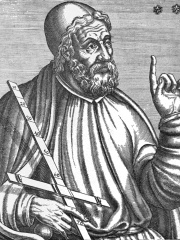


The Most Famous
ASTRONOMERS from Egypt
This page contains a list of the greatest Egyptian Astronomers. The pantheon dataset contains 644 Astronomers, 3 of which were born in Egypt. This makes Egypt the birth place of the 27th most number of Astronomers behind Austria, and Slovakia.
Top 3
The following people are considered by Pantheon to be the most legendary Egyptian Astronomers of all time. This list of famous Egyptian Astronomers is sorted by HPI (Historical Popularity Index), a metric that aggregates information on a biography's online popularity.

1. Ptolemy (100 - 170)
With an HPI of 87.07, Ptolemy is the most famous Egyptian Astronomer. His biography has been translated into 118 different languages on wikipedia.
Claudius Ptolemy (; Ancient Greek: Πτολεμαῖος, Ptolemaios; Latin: Claudius Ptolemaeus; c. 100 – 160s/170s AD), better known mononymously as Ptolemy, was a Greco-Roman mathematician, astronomer, astrologer, geographer, and music theorist who wrote about a dozen scientific treatises, three of which were important to later Byzantine, Islamic, and Western European science. The first was his astronomical treatise now known as the Almagest, originally entitled Mathēmatikḗ Syntaxis (Μαθηματικὴ Σύνταξις, Mathēmatikḗ Syntaxis, lit. 'Mathematical Treatise'). The second is the Geography, which is a thorough discussion on maps and the geographic knowledge of the Greco-Roman world. The third is the astrological treatise in which he attempted to adapt horoscopic astrology to the Aristotelian natural philosophy of his day. This is sometimes known as the Apotelesmatika (Αποτελεσματικά, 'On the Effects') but more commonly known as the Tetrábiblos (from the Koine Greek meaning 'four books'; Latin: Quadripartitum). The Catholic Church promoted his work, which included the only mathematically sound geocentric model of the Solar System, and unlike most Greek mathematicians, Ptolemy's writings (foremost the Almagest) never ceased to be copied or commented upon, both in late antiquity and in the Middle Ages. However, it is likely that only a few truly mastered the mathematics necessary to understand his works, as evidenced particularly by the many abridged and watered-down introductions to Ptolemy's astronomy that were popular among the Arabs and Byzantines. His work on epicycles is now seen as a very complex theoretical model built in order to explain a false tenet based on faith.

2. Sosigenes of Alexandria (80 BC - 100 BC)
With an HPI of 73.54, Sosigenes of Alexandria is the 2nd most famous Egyptian Astronomer. His biography has been translated into 38 different languages.
Sosigenes (Ancient Greek: Σωσιγένης) (fl. 1st century BC) was an Ancient Greek astronomer. According to Pliny the Elder's Natural History 18.210–212, Julius Caesar consulted him while he was designing the Julian calendar.

3. Timocharis (320 BC - 260 BC)
With an HPI of 61.49, Timocharis is the 3rd most famous Egyptian Astronomer. His biography has been translated into 24 different languages.
Timocharis of Alexandria (Ancient Greek: Τιμόχαρις or Τιμοχάρης, gen. Τιμοχάρους; c. 320–260 BC) was a Greek astronomer and philosopher. Likely born in Alexandria, he was a contemporary of Euclid.
People
Pantheon has 3 people classified as Egyptian astronomers born between 320 BC and 100. Of these 3, none of them are still alive today. The most famous deceased Egyptian astronomers include Ptolemy, Sosigenes of Alexandria, and Timocharis.
Deceased Egyptian Astronomers
Go to all RankingsPtolemy
100 - 170
HPI: 87.07
Sosigenes of Alexandria
80 BC - 100 BC
HPI: 73.54
Timocharis
320 BC - 260 BC
HPI: 61.49

